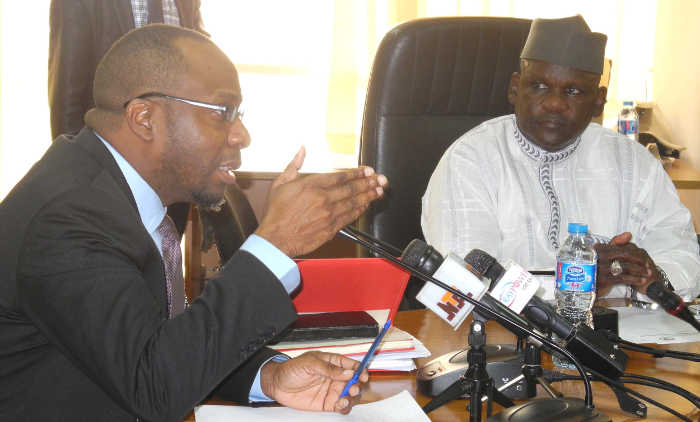- Economy: Yemi Kale Challenges Stakeholders on Quality Statistics
The Statistician-General of the Federation, Dr Yemi Kale, has charged users, producers and suppliers of statistics to re-engineer efforts in production and usage of quality statistics in Nigeria.
Kale said this at the 2018 African Statistics Day celebration in Nigeria, with the theme “High Quality Official Statistics to ensure Transparency, Good Governance and Inclusive Development’’ on Monday in Abuja.
The statistician-general was represented by Dr Isiaka Olarewaju, the Director, Real Sector and Household Statistics, National Bureau of Statistics (NBS)
”Statistics is the lens through which government can be assessed objectively and remain transparent and accountable to the people.
“ In this regard, it is the statutory responsibility of all the relevant agencies concerned to provide government with comprehensive, reliable and timely data.
“A data that would help in formulating policies as well as monitoring and evaluating key programmes and projects.
“It is my expectation that the experiences which will be shared here will help the system to produce quality statistics for Nigeria. ‘’
Kale said as a nation, economic statistics were critical in assessing the macroeconomic performance of an economy.
He said statistics on macroeconomic variables such as Gross Domestic Product (GDP) growth rate, savings, investment, interest rate, inflation, trade, unemployment, poverty, and exchange rate among others were needed to guide suitable decision making process.
He said the production of good quality economic statistics was, therefore, needed to ensure transparency and good governance for a developing economy like ours to attain economic growth and development.
According to him, good governance leads to sustainable growth which eventually brings about inclusive development and better economic status for all citizens.
“Availability and appropriate use of high quality official statistics can translate into better lives for people through providing evidence-based policy and sound decision-making.’’
Earlier, in his welcome address, Mr Sam Anja, representing Dr. Isiaka Olarewaju, stressed the need to promote statistical awareness in the country.
“For any meaningful development to be attained in any economy, the importance of reliable statistical information or key macro economic variables cannot be overemphasised.
“The NBS as the Statistical Body of Nigeria have consequently taken giant strides in areas of awareness.
“The bureau has designed the NBS quota by adding new features that make it user friendly, with these features; users have easy access to data sent.
“Besides the NBS library is been upgraded to e-library and NBS information unit has been upgraded to allow users have unhindered access to data.
“We must strive to institutionalise the use of statistics in our work and private dealing as the only way we can be able to achieve immeasurable and effective progress both as individuals and as a nation.
“ NBS will continue to play its role as advocate general in preaching and supplying the importance of statistics. ‘’
In his goodwill message, Mr Rasheed Bello, the country Director, World Bank , Nigeria, urged the Nigerian government to invest more on quality data.
He said:“it is time for the government of Nigeria to think about investing more on data to regularise a lot of these surveys to help develop policies based on evidence.’’
Also speaking at the event, a representative of Food and Agriculture Organisation(FOA), Mr Alphonsus Onwuemeka, said one of the challenges facing the country was the existence of official statistical system that were less optimal, very weak, uncoordinated and largely ineffectual.
Onwuemeka said this challenge limits policy makers, investors, citizens, international bodies from making informed decisions.
He said FAO was working with NBS and other institutions to develop the technical corporation project that would reinforce the competency of the National MDA’s to generate, analyse, store, disseminate capable and timely data.
A representative of United Nations International Children’s Emergency Fund (UNICEF), urged stakeholders to prioritise the production of estimates of children living in poor households or who face multi-dimensional poverty on a daily basis.

 Naira4 weeks ago
Naira4 weeks ago
 Naira4 weeks ago
Naira4 weeks ago
 Travel4 weeks ago
Travel4 weeks ago
 Jobs4 weeks ago
Jobs4 weeks ago
 Naira4 weeks ago
Naira4 weeks ago
 Naira3 weeks ago
Naira3 weeks ago
 Investment4 weeks ago
Investment4 weeks ago
 Travel4 weeks ago
Travel4 weeks ago




























